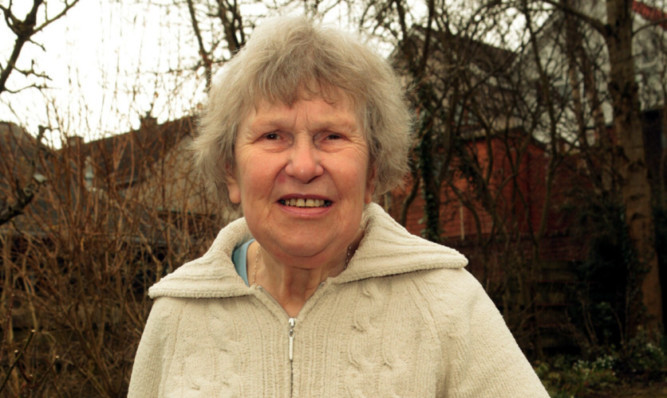A blind Angus pensioner’s complaint to the NHS following her husband’s death has led to training for nurses.
Wilma Robertson (76), from Forfar, who is registered blind, lost her husband William in July last year when he succumbed to pneumonia.
During eight weeks of visits to his bedside at the town’s Whitehills Medical Centre, Mrs Robertson was dissatisfied with how she was treated by staff.
After her husband’s death she made an official complaint to management and the head nurse on the ward quickly arranged for representatives from Deafblind Scotland to provide staff training.
Mrs Robertson was invited back to the centre to attend the presentation but remains adamant she does not want to return to the site.
She said: “The nurses were not helpful. When I asked how my husband was, I was told: ‘I don’t know’.
“I had problems with the washing and I was getting my husband’s clean washing to take home. There was not always someone to sign me in and they are always suppose to sign somebody in.
“This is the 21st century and it seems they had no idea how to deal with blind or deaf people.”
Mrs Robertson used to run a B&B in Forfar’s West High Street and began to lose her sight around three years ago. She said staff across the NHS in Tayside often do not seem to realise that blind people and those with other disabilities can require extra assistance.
“I get a lot of help in the supermarket and shops when people see me in Forfar. The one place I get no help is in doctors’ surgeries and hospitals.”
An NHS Tayside spokesperson said: “Improvements to services are part of NHS Tayside’s usual business. Improvements for people who are visually impaired currently have input from groups including the Centre for Inclusive Living and the Royal National Institute of Blind People (RNIB).
“NHS Tayside also have Vision Support Officers and other healthcare professionals involved in improvements, which are focusing on obtaining more patient feedback and the use of symbols to identify people who are visually impaired.”
A spokesman for Deafblind Scotland said that today’s society expects people living with sensory impairments to be offered the same access to information and support as anyone else.
He said: “It is encouraging that the complaint process has resulted in action which will prevent this situation arising in the future.”
